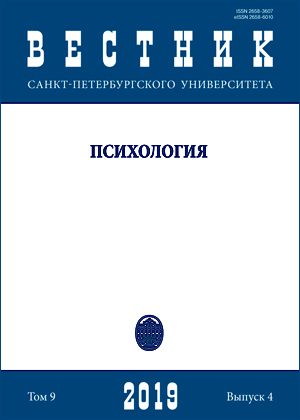Role structure in young married couples
DOI:
https://doi.org/10.21638/spbu16.2019.407Abstract
The article discusses the structure of roles in young married couples and the problem of role distribution between spouses. Currently, the majority of young spouses have disparity in their ideas about the role structure of the family, as a result of which there are disturbances in the relations between them and difficulties in the process of their adaptation to family life. One of the reasons for such difficulties may be indefinite or concrete boundaries for a young family, living conditions of spouses and the absence or presence of some experience of living together with a spouse. The article presents the empirical research results on the role structure of young couples (the results are part of a larger study). The sample consisted of young spouses in the amount of 400 people, 200 young couples, who do not yet have children. The age of the spouses was 20–30 years old (the average age of the spouses is 26,4). Couples had lives together up to five years. Research methods used included a questionnaire, testing, and the method of statistical data processing by t-Student criterion. As a method of research, a socio-demographic questionnaire and the questionnaire «Distribution of roles in the family» (Yu. Ye. Aleshina, L. Ya. Gozman, Ye. M. Dubovskaya) were employed. It was hypothesized that the ideas of men about the role structure in young married couples differ from the ideas of women, regardless of their living conditions (jointly or separately with their parents). Statistically significant differences were found in the implementation of the following family roles by spouses: raising children, in stabilizing the emotional climate in the family, and in organizing and maintaining the daily life. The data on the distribution of family roles in young families living together and separately with their parents are presented. It was concluded that the living conditions of a young couple have an insignificant effect on the family’s role structure, which is characterized by the presence of some features of egalitarianism.
Keywords:
role structure, family roles, role expectations, mismatch of ideas about family role structure, living conditions of spouses
Downloads
References
References
Downloads
Published
How to Cite
Issue
Section
License
Articles of "Vestnik of Saint Petersburg University. Psychology" are open access distributed under the terms of the License Agreement with Saint Petersburg State University, which permits to the authors unrestricted distribution and self-archiving free of charge.




